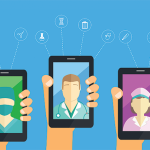The Consumer Technology Association has launched a new initiative aimed at highlighting the value of digital therapeutics, a platform that uses mHealth technology to assist and often replace office visits and medication.
Roughly two dozen mHealth and telehealth companies are joining forces with the Consumer Technology Association to develop standards for digital therapeutics.
The CTA’s initiative aims to create a higher profile for connected health technologies that often replace or are used alongside pharmaceutical interventions, such as medications. They’re defined by the CTA as digital tools that use “software applications to enhance clinician decision making, optimize the dose and delivery of other forms of medical treatment through monitoring patient data in real time, or act as a standalone intervention.”
Telehealth advocates see this emerging field as an opportunity to improve remote patient monitoring and home-based care and reduce the need for expensive clinic visits and potentially addictive medications. Examples include rehab and therapy platforms, mHealth apps, wearables and augmented and virtual reality treatments.
“There are vast opportunities to innovate in this space to improve patient outcomes and lower costs,” Kerri Haresign, the organization’s director of technology and standards, said in a press release. “But to increase use and adoption, we need to document a common understanding of the technology. The group will also focus on distinguishing between general digital health technology and technology used for intervention.”
Want to publish your own articles on DistilINFO Publications?
Send us an email, we will get in touch with you.
“With the COVID-19 pandemic, we are seeing faster innovation across all aspects of digital health including digital therapeutics,” added CTA President and CEO Gary Shapiro. “This field takes the application of technology beyond just wellness tracking. Companies are now developing solutions that can manage pain, allergies and even address mental health problems. As more people take control of their own health in the comfort and safety of their homes, we must understand what this technology means and how to advance its adoption.”
CTA, which hosts the massive CES conference every January in Las Vegas (the 2021 version will be virtual), has taken several steps in recent years to promote consumer-facing mHealth and telehealth tools and services in an effort to close the gap between commercial and clinical adoption.
In April, the organization partnered with the American Telemedicine Association to release the Digital Health Care Directory, a database of mHealth and telemedicine technology for consumers and providers looking for resources during the coronavirus pandemic. And in July, the CTA launched the Public Health Tech Initiative, a task force aimed at creating new opportunities for the use of consumer technology in dealing with public emergencies like the COVID-19 crisis.
The organization has also released digital health standards for the use of artificial intelligence (AI) and for physical activity and stress monitoring performance requirements in healthcare.
Source: mHealth Intelligence






